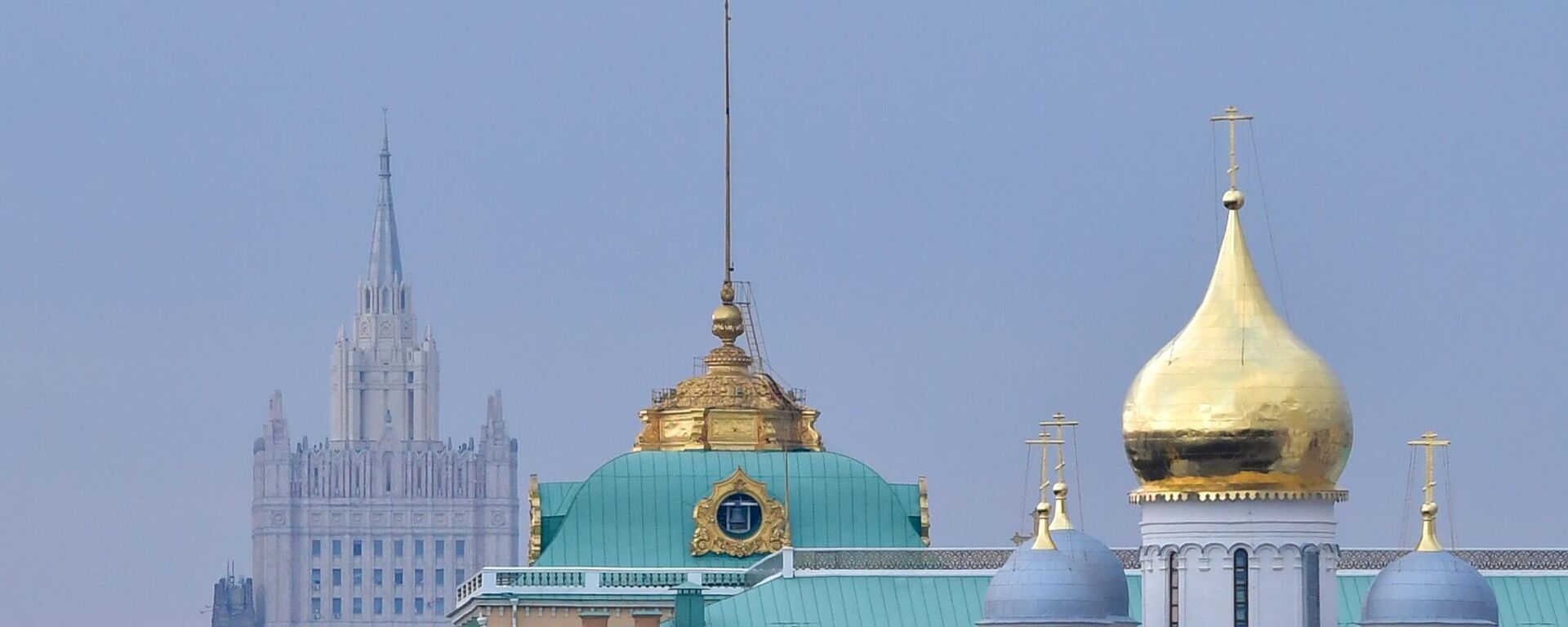https://sputnikglobe.com/20240112/us-uk-seem-bent-on-protecting-israel-by-attacking-yemen-1116129798.html
US, UK Seem 'Bent on Protecting Israel' by Attacking Yemen
US, UK Seem 'Bent on Protecting Israel' by Attacking Yemen
Sputnik International
The US and Britain want to “show their leadership over the world and their ability to strike and to confront any threat not only in Europe and in the Atlantic, but also in the Middle East,” says Ayman Yousef, professor of political sciences and international relations at the Arab-American University in Palestine.
2024-01-12T15:15+0000
2024-01-12T15:15+0000
2024-01-12T15:19+0000
analysis
middle east
yemen
israel
houthis
airstrikes
https://cdn1.img.sputnikglobe.com/img/07e8/01/0c/1116132755_0:120:2297:1412_1920x0_80_0_0_52b50e026f0ce01c956858991155ffcc.jpg
Late on January 11, American and British forces launched a string of airstrikes against Yemen, ostensibly in retaliation for the attacks previously conducted by the Houthi rebels against Israeli-linked vessels traversing the Gulf of Aden.The Houthis started conducting their attacks on Israeli-linked ships in response to Tel Aviv’s brutal invasion of the Gaza Strip, with the United States using the Houthis’ actions as a pretext for launching a joint naval operation off the coast of Yemen – seemingly to protect shipping traffic – and now to directly attack Yemen.While the threat posed by the Houthis to the “flow of international shipping” through a vital waterway that connects “East Asia with Europe through Bab-el-Mandeb and the Suez Canal and then to the Mediterranean” was indeed one of the factors that led to the joint US-British assault on Yemen, this attack should also be regarded in a different context, says Ayman Yousef, professor of political sciences and international relations at the Arab-American University in Palestine.According to him, the United States and the UK “do not want Israel to be involved in this kind of confrontation” due to how sensitive the ongoing crisis in the Gaza Strip is to people in many Arab countries, so Washington and London resorted to attacking Yemen and the Houthis themselves.The professor also argued that the US and Britain want to “show their leadership over the world and their ability to strike and to confront any threat not only in Europe and in the Atlantic, but also in the Middle East.”Meanwhile, Shahram Akbarzadeh, expert in the Middle Eastern politics at Deakin University, told Sputnik that the attack on Yemen by the US and British forces was a “very dangerous move.”While many Muslim countries merely condemned Israel for its invasion of the Gaza Strip, the Houthis had actually taken action against Israeli interests and are now “paying the price” for it, which the Yemeni movement will now wear with pride.“The US action has confirmed the worldview that Washington is bent on protecting Israel and has no regard for Muslims,” Akbarzadeh remarked, adding that the US move “will reinforce the notion that Muslims are under siege and have no recourse to justice.”As for how this emerging crisis might unfold, Akbarzadeh suggested that the Houthis will surely “double down on their campaign in the Red Sea” while “Hezbollah and other anti-US paramilitary groups in the region are likely to see this escalation as a signals to strike US targets, which by definition would include soft targets outside the region.”His sentiment was echoed by Yemeni political analyst Mohammad al-Qaidi who told Sputnik Arabic that Yemen’s response to this “US aggression” will not be limited to the Red Sea, with all US military installations in the region now becoming legitimate targets for the Houthis.He promised that the American airstrikes, conducted with the assistance from Britain and several other countries, including some Arab states, will not go unanswered and will receive a proper response.“The people of Yemen will not be watching silently at this brutal aggression,” al-Qaidi said.He pointed out that Yemen is capable of protecting its territory without any foreign assistance, while US military installations in the Persian Gulf and the Horn of Africa are now potential targets for “any retaliatory actions.”Al-Qaidi also branded the US and the UK attacks as unjustified, since the Houthis have never attacked any cargo vessels that were not linked to Israel.“All this shows the level of involvement of Western states in the aggression against Gaza,” he said. “It is an attempt to attack and break those who protect the Palestinian people.”
https://sputnikglobe.com/20240112/us-uk-trying-to-distract-from-genocide-in-gaza-by-strikes-in-yemen---houthi-member-1116126421.html
https://sputnikglobe.com/20240112/strikes-on-yemen-are-another-example-of-disregard-for-international-law---moscow-1116127556.html
yemen
israel
Sputnik International
feedback@sputniknews.com
+74956456601
MIA „Rossiya Segodnya“
2024
News
en_EN
Sputnik International
feedback@sputniknews.com
+74956456601
MIA „Rossiya Segodnya“
Sputnik International
feedback@sputniknews.com
+74956456601
MIA „Rossiya Segodnya“
us uk attack yemen, us navy yemen attack,
us uk attack yemen, us navy yemen attack,
US, UK Seem 'Bent on Protecting Israel' by Attacking Yemen
15:15 GMT 12.01.2024 (Updated: 15:19 GMT 12.01.2024) This week, the United States and Britain have essentially shown the entire world exactly how dedicated they are to peacefully resolving the Gaza Strip crisis.
Late on January 11, American and British forces launched a string of airstrikes against
Yemen, ostensibly in retaliation for the attacks previously conducted by the Houthi rebels against Israeli-linked vessels traversing the Gulf of Aden.
The Houthis started conducting their attacks on Israeli-linked ships in response to Tel Aviv’s brutal invasion of the
Gaza Strip, with the United States using the Houthis’ actions as a pretext for launching a joint naval operation off the coast of Yemen – seemingly to protect shipping traffic – and now to directly attack Yemen.
While the threat posed by the Houthis to the “flow of international shipping” through a vital waterway that connects “East Asia with Europe through Bab-el-Mandeb and the Suez Canal and then to the Mediterranean” was indeed one of the factors that led to the joint US-British assault on Yemen, this attack should also be regarded in a different context, says Ayman Yousef, professor of political sciences and international relations at the Arab-American University in Palestine.

12 January 2024, 06:11 GMT
According to him, the United States and the UK “do not want Israel to be involved in this kind of confrontation” due to how sensitive the ongoing crisis in the Gaza Strip is to people in many Arab countries, so Washington and London resorted to attacking Yemen and the Houthis themselves.
The professor also argued that the US and Britain want to “show their leadership over the world and their ability to strike and to confront any threat not only in Europe and in the Atlantic, but also in the Middle East.”
“I don't think the current strike will spill over to more direct confrontation between al-Houthis in Yemen and the US and the UK. It is still limited. It is still within a control,” he added. “We have to wait. We have to wait a bit and see if the confrontation will really have more implications for Iran, more implications for the current war in Gaza and for other actors in the region.”
Meanwhile, Shahram Akbarzadeh, expert in the Middle Eastern politics at Deakin University, told Sputnik that the attack on Yemen by the US and British forces was a “very dangerous move.”
“Houthis are challenging Israeli interests in a very tangible way, and the US is there to punish them for their action. This is a punitive measure. And it is designed to protect Israel,” he asserted.
While many Muslim countries merely condemned Israel for its invasion of the Gaza Strip, the Houthis had actually taken action against Israeli interests and are now “paying the price” for it, which the Yemeni movement will now wear with pride.
“The US action has confirmed the worldview that Washington is bent on protecting Israel and has no regard for Muslims,” Akbarzadeh remarked, adding that the US move “will reinforce the notion that Muslims are under siege and have no recourse to justice.”
“The legal arguments about freedom of navigation at sea will be lost in the fog of war. The impression that will remain is that Muslims are at war with the West. This impression maybe simplistic and factually incorrect, but nonetheless potent and emotive,” he argued.
As for how this emerging crisis might unfold, Akbarzadeh suggested that the Houthis will surely “double down on their campaign in the Red Sea” while “Hezbollah and other anti-US paramilitary groups in the region are likely to see this escalation as a signals to strike US targets, which by definition would include soft targets outside the region.”
His sentiment was echoed by Yemeni political analyst
Mohammad al-Qaidi who told
Sputnik Arabic that Yemen’s
response to this
“US aggression” will not be limited to the Red Sea, with all US military installations in the region now becoming legitimate targets for the Houthis.

12 January 2024, 08:38 GMT
He promised that the American airstrikes, conducted with the assistance from Britain and several other countries, including some Arab states, will not go unanswered and will receive a proper response.
“The people of Yemen will not be watching silently at this brutal aggression,” al-Qaidi said.
He pointed out that Yemen is capable of protecting its territory without any foreign assistance, while US military installations in the Persian Gulf and the Horn of Africa are now potential targets for “any retaliatory actions.”
Al-Qaidi also branded the US and the UK attacks as unjustified, since the Houthis have never attacked any cargo vessels that were not linked to Israel.
“All this shows the level of involvement of Western states in the aggression against Gaza,” he said. “It is an attempt to attack and break those who protect the Palestinian people.”




